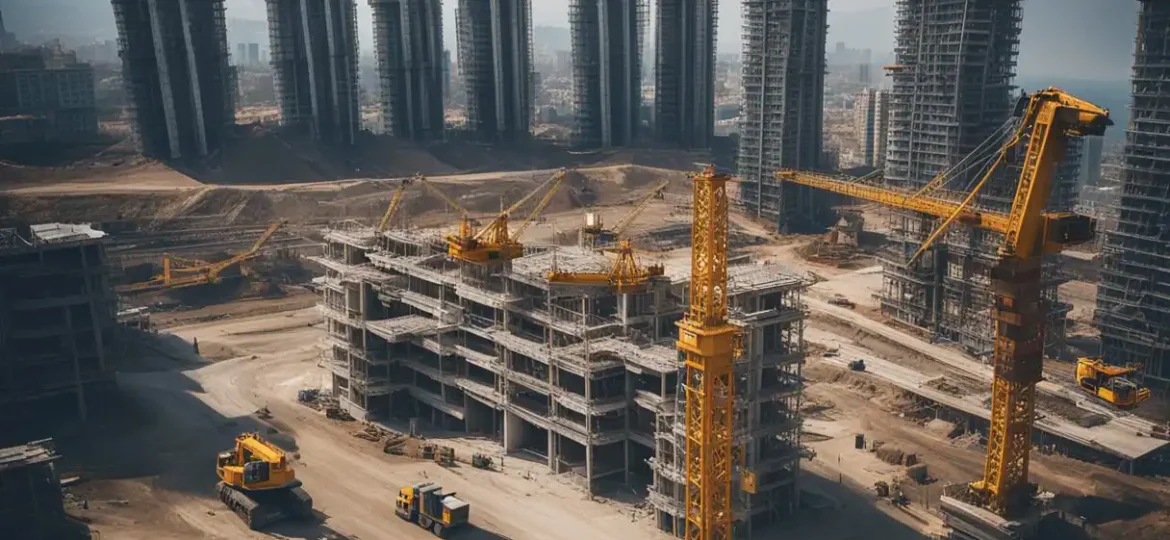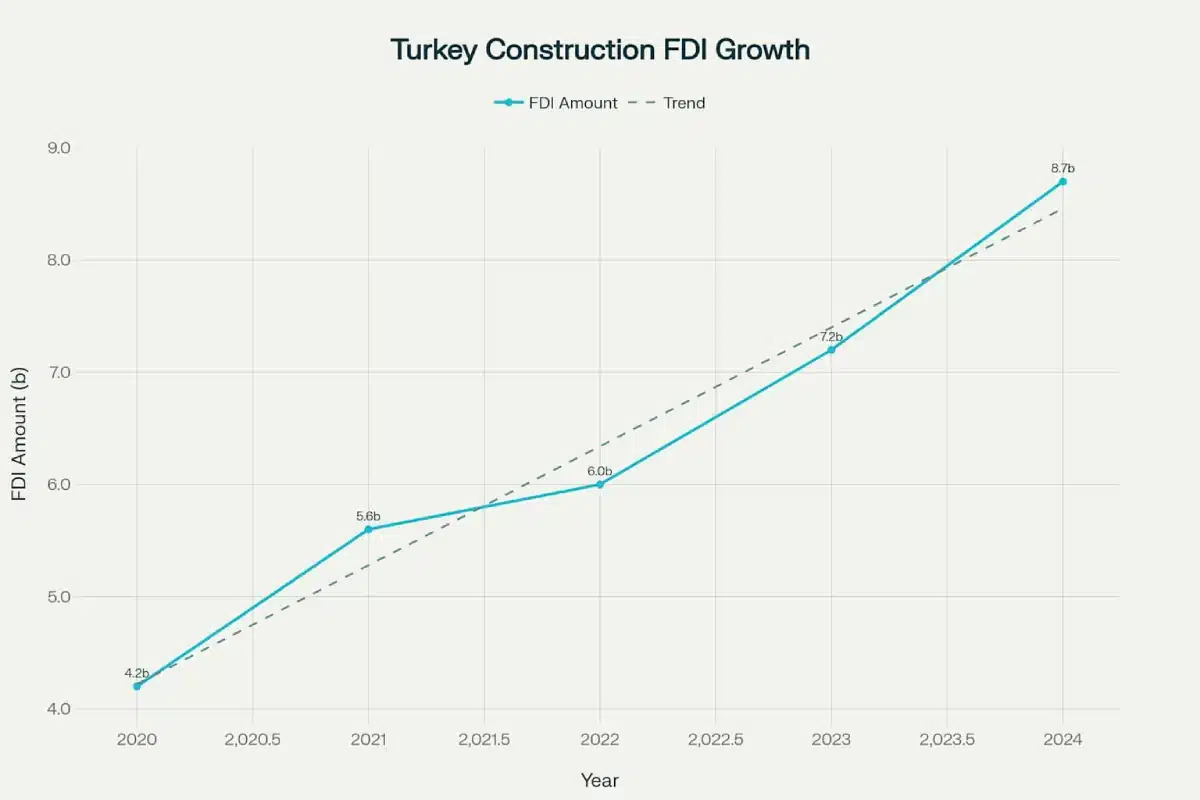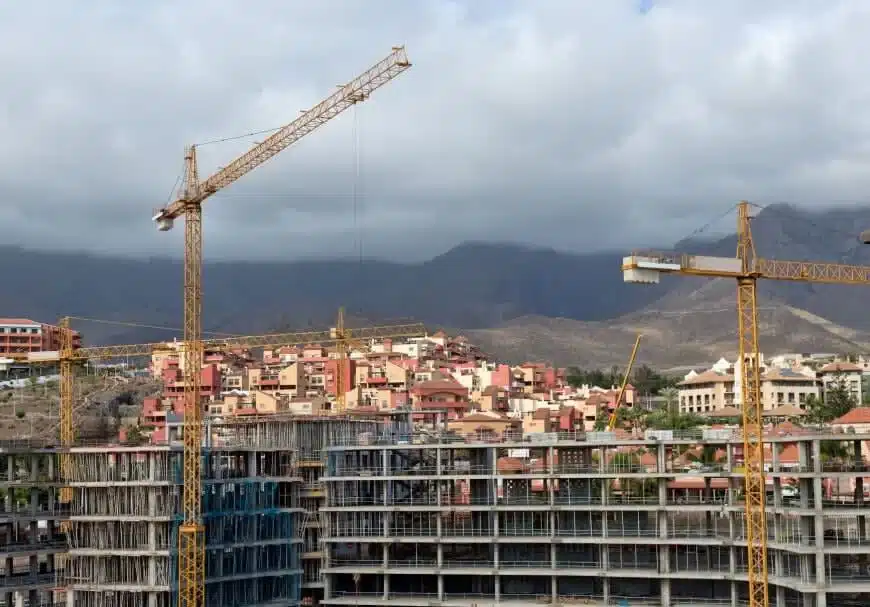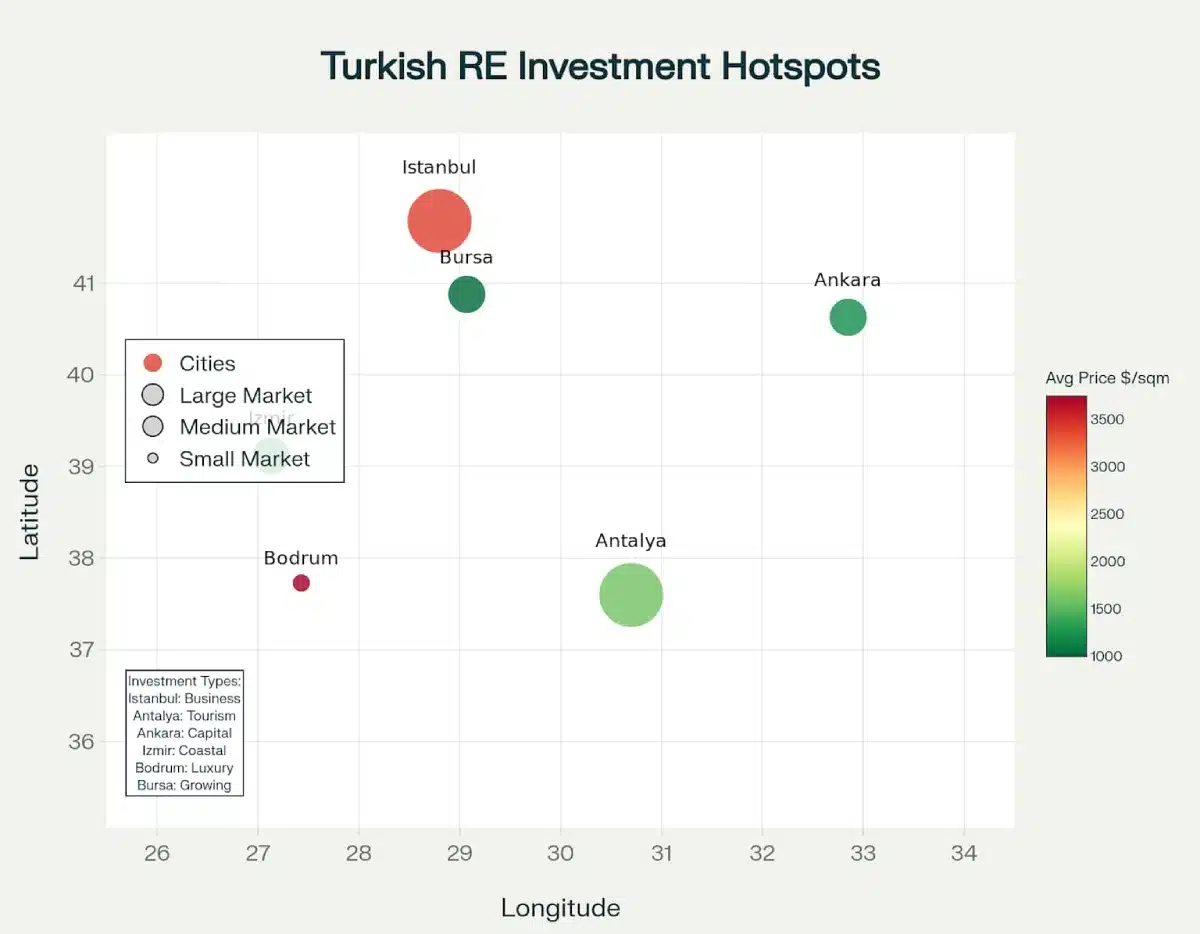
Turkish construction companies have driven unprecedented market growth in 2025, with foreign direct investment reaching $8.7 billion—a 23% increase from 2024.
The sector’s projected growth rate is 15.3% for 2026, driven by boutique developments such as luxury villas, boutique hotels, office spaces, and compact manufacturing facilities. With the average construction cost per square meter in Istanbul ranging between 1,200, and a record 14,600 building permits issued to foreign buyers in 2025, Turkey’s building sector has become a magnet for global partners. Specialized builds can typically be delivered in 8–14 months, ensuring faster returns compared to many competing markets.

Leading companies, such as those that focus on static design and structural engineering, are helping set new standards in the industry. Many have completed strong and smart projects, and some, like specialists in safe building and structural design, are recognized for their reliable work.
The largest construction hubs in Turkey are supporting commercial and infrastructure growth across the region. As these companies handle new challenges, like stricter rules and changing markets, they continue to shape the future of building in Turkey and beyond.
Key Takeaways
- Turkish firms play a big role in large-scale construction worldwide.
- Many companies focus on steel and smart building technology.
- The sector is growing despite challenges and competition.
Overview of Turkish Construction Companies
Key Market Players
Leading companies such as Enka, Rönesans, and GAMA are known for large-scale international and domestic projects. Several firms, including Yahya Construction, have earned a solid reputation by completing complex residential and commercial developments.
Turkish engineering firms’ strong technical skills make them a top choice for governments and investors. Some construction contractor in Turkey companies specialize in roads and transport, while others focus on energy and industrial projects.
Most key players maintain their main offices in Istanbul. The presence of international branches allows them to manage projects worldwide. These firms create jobs for architects, engineers, and tradespeople.
Growth and Trends
Turkish construction companies have grown rapidly in the last decade. Expansion into foreign markets, especially Africa and Central Asia, has led to higher revenue and new contracts.
Sustainable construction is a new trend. More companies use green materials and energy-efficient designs. Digital tools, like Building Information Modeling (BIM), are now common.
Investment in infrastructure projects, such as new airports and metro lines, continues to rise. Foreign demand for Turkish contractors remains steady, especially in large public projects and private real estate ventures. This keeps the sector competitive and active.
Specialized Steel Construction Firms in Turkey

Turkey has a large network of companies focused on steel construction, ranging from industrial contractors to firms handling complex commercial projects. They use new building methods and supply key structures for both domestic and export markets.
Steel Contractors
Specialized contractors in Turkey handle projects such as steel bridges, factories, warehouses, and high-rise frames. Many are skilled in modular and prefabricated steel structures. These methods can lower costs and speed up completion times, making them attractive for international clients.
Notable firms like Yahya Construction have completed major steel frame buildings for factories and logistics centers. They often provide services from design through to assembly on-site. Turkish contractors use advanced welding, bolting, and coating techniques to meet strict safety and durability standards.
Quality and speed are top priorities for these contractors. Many hold international certifications, allowing them to work on projects in Europe, the Middle East, and Africa. Demand is high from both local industries and foreign investors building in Turkey.
Steel Construction in Turkey
Turkey’s steel construction market is one of the largest in the region. It has grown steadily, due to rising demand for modern infrastructure and industrial buildings. Steel construction market size data shows that the sector is valued in billions of dollars.
Steel frame construction is popular for its strength and ability to withstand earthquakes, a top concern in Turkey. Major cities see frequent use of steel frames in commercial and residential buildings. Turkish firms also export steel segments and construction services across Europe and the Middle East.
How to Compare Turkish Construction Companies

When choosing from the many Turkish construction companies, it’s important to compare them based on clear technical and practical factors — not just reputation. Below are key criteria to help clients, developers, and investors identify the most suitable firm for their projects.
1. Specialization and Project Type
Not all firms offer the same services. Some focus on steel construction, others on residential housing, infrastructure, or interior fit-out. For example, Yahya Construction provides specialized steel frame solutions and complex multi-use buildings.
2. Previous Projects and Documentation
Check their past work. Look for full documentation: blueprints, client references, and images. For high-profile international projects, companies like ENKA and Rönesans have extensive archives showcasing their experience.
3. Engineering Standards and Certifications
Reliable companies often follow international standards like ISO 9001, ISO 14001, and use digital tools like Building Information Modeling (BIM). Firms such as Yahya Construction apply these tools for quality control and transparent execution.
4. International Presence
Companies with projects abroad tend to have stronger logistics, financial planning, and language/cultural flexibility. Refer to the ENR Top International Contractors to see which Turkish firms are globally recognized.
5. Transparent Proposals and Budget Control
A trustworthy contractor submits a complete proposal including scope, payment terms, timeline, and materials. If key elements are missing — that’s a red flag. Consider asking for BOQs (Bill of Quantities) and comparing them with local averages.
6. Sustainable Practices
If you care about environmental impact, check if the firm uses green materials, energy-efficient systems, or aims for LEED certification. The World Green Building Council provides guidance on what sustainable construction includes.
Comparison Table: Leading Companies
| Company | Specialty | Regions | Notable Projects |
|---|---|---|---|
| ENKA | Infrastructure, Energy | Global | Moscow Towers, Iraq Power Plants |
| Rönesans | Healthcare, Real Estate | Europe, Russia | Lakhta Center, Hospitals in Turkey |
| Yahya Construction | Steel, Interior Design | Turkey, Indonesia, Syria | Logistics hubs, Housing Projects |
| Tekfen | Oil & Gas, Infrastructure | MENA | Pipelines, Industrial Plants |
These criteria help narrow down the right partner for your project and ensure you’re working with a firm that meets modern standards for quality, safety, and long-term value.
In-Depth Local Market Analysis: Best Turkish Cities for Construction Investment

Turkey’s building sector is regionally diverse. City selection is strategic for every overseas developer or global partner. Here’s a data-driven look at the top destinations for boutique developments and specialized builds in 2025:
Istanbul: The Nation’s Growth Engine
- Annual Growth Rate: 18% in 2025–2026
- Average Returns: 15–20% on mid-scale residential, villa, and office projects (See ROI Analysis)
Antalya: The Tourism-Driven Magnet
- Tourism Growth: 25% annual increase in 2025
- Ideal Construction Seasons: Spring & Autumn (Building Insights)
Ankara: Value and Institutional Stability
- Cost Advantage: Up to 20% cheaper than Istanbul (Construction Cost Analysis)
- Top Districts: Çankaya (business & embassies), Yenimahalle
Leading Regional Construction Hubs and Firms in Turkey

Major Turkish cities stand out for their construction activity, shaping urban life through commercial towers, housing, and major infrastructure. Regional companies based in these hubs play a significant role in the national economy and drive new architectural trends.
Istanbul Construction Companies
Istanbul leads Turkey’s construction sector, with many of the country’s largest firms based in the city. The city’s skyline is shaped by well-known firms like ENKA, Yapi Merkezi, and Renaissance Construction. They manage large infrastructure projects and high-rise developments, influencing building styles and urban design across Turkey. A high concentration of contractors in Istanbul has helped the city become a focal point for innovation in construction technology.
Istanbul firms are active beyond Turkey, working on international airport terminals, stadiums, and commercial centers. According to regional statistics, Istanbul has the highest number of registered construction companies in the country. Companies such as Yahya Construction also contribute to the sector with a range of project types, including residential buildings and interior design.
Emerging Cities
Other cities like Ankara, Izmir, Bursa, and Antalya are important centers for construction. Ankara, as the capital, sees ongoing government projects and infrastructure developments. Izmir is known for urban regeneration and port-related construction. Bursa and Antalya focus more on tourism-related buildings, resorts, and residential complexes.
Why Turkish construction companies ?

Industry Innovations
New technology changes the way projects are managed and built. Many firms invest in Building Information Modeling (BIM) to spot design errors early and keep projects on track.
Use of drones and digital tools is growing, making it easier to inspect sites and update progress faster. Some projects use modular building methods, which save time and cut waste.
Yahya Construction, for example, uses BIM and on-site safety apps during large-scale housing projects in Istanbul. This reduces errors and keeps workers safe.
Adopting new solutions can take time, especially for firms lacking skilled staff or the funds to modernize. Still, companies that use these tools often finish projects more quickly and with better quality.
Sustainable Construction
Demand for environmentally friendly buildings is rising in Turkey and other regions where Turkish companies work.
Builders are using more energy-efficient designs, recycled materials, and technologies that lower water and electricity use. Green certification, such as LEED, is now more common for new office buildings and apartments.
Some firms apply these standards to public schools, hospitals, and mixed-use projects. They may use solar panels, smart lighting, and better insulation to cut long-term costs.
Table: Common Sustainable Practices in Turkish Construction
| Practice | Example Application |
|---|---|
| Recycled materials | Flooring, wall panels |
| Smart lighting | Office complexes |
| Green roofs | Apartment buildings |
| Solar panels | Shopping centers |
| High-efficiency glazing | Hospitals & schools |
Sustainable construction helps companies meet both legal rules and customer expectations. It also helps them save money over time and reduce environmental harm.
Frequently Asked Questions
Turkish construction companies are active in many countries including Europe and the USA. Some of these firms are recognized internationally and have contributed to major project developments and industry rankings.
What are the leading Turkish construction companies operating in Europe?
Some of the top Turkish firms working in Europe include Rönesans Holding, ENKA, Tekfen Construction, and GAMA Holding. These companies take part in many large building, infrastructure, and energy projects in countries like Russia, Germany, and the UK.
How can one find employment opportunities within Turkish construction companies?
Job seekers can visit the official websites of Turkish construction firms, where job boards and careers pages are available. Many companies also post openings on LinkedIn and major international job sites. Some firms work with recruitment agencies, especially for roles outside Turkey.
Which Turkish construction firms are listed in the Engineering News-Record (ENR)?
Turkish companies often ranked in the ENR Top 250 include Rönesans Holding, ENKA, Limak Holding, Tekfen Construction, and GAMA. These firms are recognized for their volume of international contracts and project work abroad.
What are some notable projects completed by top Turkish construction companies?
ENKA completed the Moscow City business district’s major towers in Russia. Rönesans Holding built the Lakhta Center in St. Petersburg. Yahya Construction has taken part in several highway and transportation projects, especially in Eastern Europe. Limak helped develop Istanbul Airport, one of the world’s largest.
How does the construction industry in Turkey contribute to the global market?
Turkish construction companies take part in international infrastructure, energy, and housing projects. Their experience in fast project delivery and cost-effective construction makes them strong competitors. Turkish firms are also among the top international contractors in Europe, Africa, and Central Asia.
Turkey has established a clear investment framework to protect and incentivize overseas developers:
- Building Permits: Statistics & Process
- Incentives for Sustainable Projects
- Taxation Insights for International Investors

